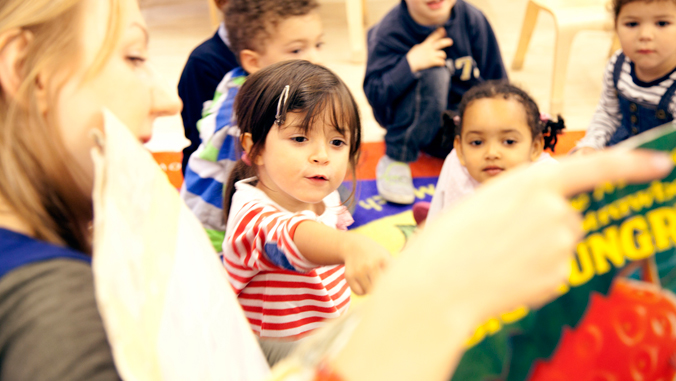What do children get out of reading? I’d argue that children get the same things out of books that adults do.

Ask a grownup booklover what they like about them and they’ll tell you it’s the adventure, the escape from the mundane, and the chance to explore new worlds. They’ll say they are drawn to the sound of the language as its read and the images of the scenes created, even if these are only experienced in their mind.
Young children are also exposed to new sounds through reading, along with words and phrases which they can try out, copy and add to their vocabulary. Reading isn’t just a fun activity for home or nursery but prepares them for the first steps of their academic life. It will lead them to become more confident in speaking and singing, which could lead to an interest in theatre, presenting, debating or giving speeches. As we know, it will also help when learning to read and write – a strong foundation for learning in their future years.
So which type of book is appropriate for different stages of early life?
For babies and very young children, I recommend showing them shorter books which have hardwearing, cardboard pages. The books should have simple, single words or images which you can point to and speak aloud so that the child can hear the phrase while seeing the corresponding picture.
This allows them to learn words very quickly.
Some books come with parts the child can touch and feel, with different textures like cloth or indented cardboard, or even Velcro or sandpaper; other books have flap elements. Although not necessary, interactive books can help to draw the child’s attention.
As children get older, they can progress to longer books to learn more words or books where they are exposed to two words together at a time or very short sentences.
While they are very young, children are also learning to hold books. Because of this, smaller books tend to be easier for younger children to handle than the large ones.
You should base the choice of books on the words the children are ready to learn. Don’t be afraid to stretch them; but understand that if the book is too far ahead of their comprehension level; then children may baulk, become distracted, fidget or even wander off.
There is an extensive range of books on the market for children, and you can find useful lists of the various types here.
As an early years professional with years of experience, a couple of firm favourites come to mind:
‘Going on a Bear Hunt,’ by Michael Rosen is a children’s classic. Older children can participate in the actions – like pretending to walk through ‘swishy swashy grass,’ and ‘thick oozy mud’ – and also the words, as they memorise them and join in with the storytelling.
At Townmead Community Nursery – which I help to manage in Fulham – we have a settling in period of three days followed by a longer period of six weeks. During this time, the child adjusts to the nursery with the aid of an attentive and caring key person.
While settling in, children can feel a bit out of sorts as they adjust to the new environment, and there is a favourite book that many children request during this time, ‘Freddie and the Fairy,’ by Julia Donaldson. Freddie cannot pronounce his wishes correctly, so his fairy ends up granting him different wishes from the ones he actually wants. The humourous items Freddie receives instead, delivered by the kind and matronly fairy, and the lovely pastel-coloured illustrations, makes the book a great way to improve moods; nursery can’t be such a bad place if it has such a lovely book on its shelf!
There is a wonderful quote: ‘people say that life is the thing, but I prefer reading.’ A book lover will understand this; but unfortunately, there comes a time when reading is over and one must get back to ‘real’ life. In the early years, books are just as important as the rest of our wide-ranging early-years curriculum. But for many, they are a starting point, for others an inspiration and for some, a sanctuary.
Written by Maryanne McGregor EYFS, MBA (Deputy Manager at Townmead Community Nursery, part of the London Early Years Foundation (LEYF))

You must be logged in to post a comment.